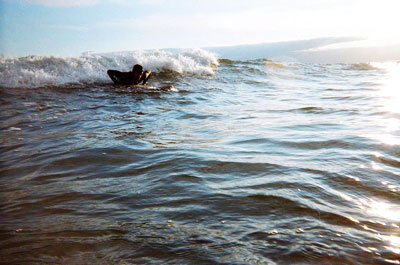 |
| Therapeutic recreation students Lukas Akerley and Claire Lederman try out their boards on the beach before heading to the water. (Photo by Jill Manos) |
With autumn in full swing, sunscreen, flip-flops and trips to the beach seem like a thing of the past. But despite cooler temperatures and falling leaves, now is the best time to hit up Nova Scotiaâs beaches to experience the best surf on the eastern seaboard. Even if youâve never surfed before, now is an ideal time to learn.Â
Temperatures that have dipped below the freezing mark havenât stopped husband and wife Nico and Jill Manos from giving surfing lessons. For the past four years, theyâve owned and instructed for Nova Scotia Surf School, based out of Nova Scotiaâs surfing mecca, Lawrencetown Beach.
Nico and Jill feel the fall is a perfect time to participate in surfing lessons. You may not get tan lines, but you will get personalized attention. Not to mention that sea-shell-seeking tourists have gone home so the beaches are less crowded and that means beginners donât have to worry about ploughing into people with their surfboards.
 |
| Lukas Akerley heads out. (Photo by Jill Manos) |
What about the frigid temperatures? âWhat a lot of people donât realize is that the Atlantic Ocean is such a big body of water, it takes a really long time to warm up, but it takes a really long time to cool down,â explains Nico. In other words, the water temperature is warmer now than it was in July or August. Still not convinced? The wetsuits are full length and hold in body heat.
I was skeptical myself of taking on the Atlantic waves mid-October, not to mention I have a slight fear of dark water. But I figured since it was mid-October and the beaches would be virtually empty, only my instructor would notice if I chickened out.
As we lay on top of the surfboards on the beach and practiced dry land paddling and maneuvers on our boards, I found it hard to listen to Jillâs instructions. I couldnât help but notice how hard the waves slammed down on the shoreline. Then, thoughts of stinging jellyfish and biting sharks crossed my mind.Â
My fears were swept away the moment we entered the water. Each wave presented a new opportunity for me to master the new skill I was learning. I was having such a good time trying to conquer the waves, I didnât even notice the temperature of the water, and my fears of sea creatures and dark water became things of the past.
 |
| Therapeutic recreation students Lukas Akerley and Claire Lederman at Lawrencetown Beach. (Photo by Jill Manos) |
Itâs easy to see that with Nova Scotiaâs lack of palm trees, white sandy beaches, and warm weather, why Nico is Nova Scotiaâs one and only professional surfer. But that doesnât mean that Nova Scotia beaches donât have some of the best waves in the world.
With memories still fresh of Hurricane Juan, most Haligonians wince when they hear the word âhurricane.â Not so for the 500 members of Nova Scotiaâs surf community.
Nico explains that storms produces swells in the ocean causing bigger waves, which makes it ideal for the more experienced surfers. And, because of Nova Scotiaâs angle in the Atlantic, the swells hit us directly. âIf you approach any surfer worth their salt in California, Hawaii, Australia, and say youâre from Nova Scotia, theyâll respond, âyou guys have some great point breaks!ââ
